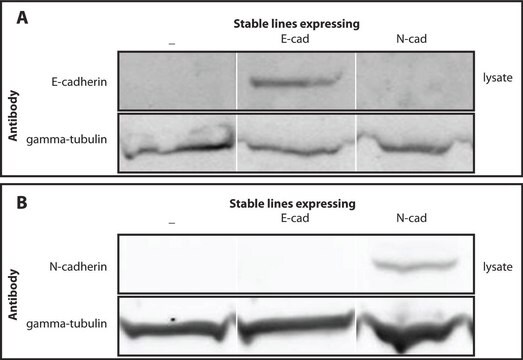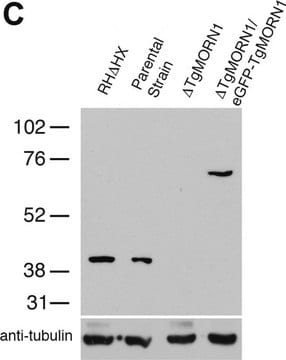MAB1864-I
Anti-alpha-Tubulin Antibody, tyrosinated, clone YL1/2
clone YL 1/2, from rat
Synonym(s):
Tubulin alpha-1A chain, Alpha-tubulin 3, Tubulin B-alpha-1, Tubulin alpha-3 chain, alpha-Tubulin, tyrosinated
About This Item
Recommended Products
biological source
rat
Quality Level
antibody form
purified immunoglobulin
antibody product type
primary antibodies
clone
YL 1/2, monoclonal
species reactivity
yeast, porcine, rat, chicken, bovine, human, mouse
technique(s)
ELISA: suitable
electron microscopy: suitable
immunocytochemistry: suitable
immunohistochemistry: suitable
radioimmunoassay: suitable
western blot: suitable
isotype
IgG2aκ
NCBI accession no.
UniProt accession no.
shipped in
wet ice
target post-translational modification
unmodified
Gene Information
human ... TUBA1A(7846)
General description
Specificity
Immunogen
Application
Cell Structure
Adhesion (CAMs)
Immunocytochemistry Analysis: 4.0 µg/mL from a representative lot detected tyrosinated alpha-tubulin in A431, HeLa and HUVEC cells.
Immunocytochemistry Analysis: Representative lots detected phenylalaninated alpha-tubulin immunoreactivity in yeast and tyrosinated alpha-tubulin immunoreactivity in HEK293 cells (Kilmartin J.V., et al. (1982). J Cell Biol. 93(3):576-582; Bandyopadhyay, B., et al. (2007). J Biol Chem. 282(22):16454-16464).
Immunohistochemistry Analysis: A representative lot detected microtubules tyrosinated alpha-tubulin immunoreactivity in mid-streak level section of Hamburger-Hamilton stage 4 (HH4) chick embryos (Nakaya, Y., et al. (2008). Nat. Cell Biol. 10(7):765-775).
Electron Microscopy Analysis: Representative lots detected microtubules phenylalaninated alpha-tubulin immunoreactivity using crude yeast nuclear envelope preparations and microtubules tyrosinated alpha-tubulin immunoreactivity in NIH/3T3 cells (Wehland, J., and Willingham, M.C. (1983). J Cell Biol. 97(5 Pt 1):1476-1490; Kilmartin J.V., et al. (1982). J Cell Biol. 93(3):576-582).
ELISA Analysis: The antigenicity of clone YL1/2 was determined by competitive ELISA using pig brain-derived tubulin against alpha-tubulin peptides with or without Tyr/Phe at the C-terminal end (Wehland, J., et al. (1984). EMBO J. 3(6):1295-1300).
Radioimmunoassay Analysis: The immunoreactivity of clone YL1/2 toward chick brain tubulin and yeast tubulin was determined by radioimmunoassays (Kilmartin J.V., et al. (1982). J Cell Biol. 93(3):576-582).
Quality
Western Blotting Analysis: 1.0 µg/mL of this antibody detected tyrosinated alpha-tubulin in 10 µg of A431 cell lysate.
Target description
Physical form
Storage and Stability
Other Notes
Disclaimer
Not finding the right product?
Try our Product Selector Tool.
Storage Class Code
12 - Non Combustible Liquids
WGK
WGK 1
Flash Point(F)
Not applicable
Flash Point(C)
Not applicable
Certificates of Analysis (COA)
Search for Certificates of Analysis (COA) by entering the products Lot/Batch Number. Lot and Batch Numbers can be found on a product’s label following the words ‘Lot’ or ‘Batch’.
Already Own This Product?
Find documentation for the products that you have recently purchased in the Document Library.
Customers Also Viewed
Our team of scientists has experience in all areas of research including Life Science, Material Science, Chemical Synthesis, Chromatography, Analytical and many others.
Contact Technical Service












